Compiling this data was not as hard as I expected, let's go through the data and the shiny graphs!
Age of Beeple
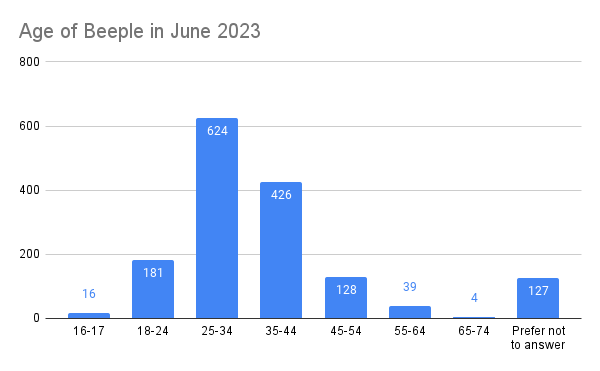
Most are above 24! Seems we got an older average age compared to a lot of social media. It would be interesting to see how many came here with experiences from independent forums before Reddit.
Where Beeple reside

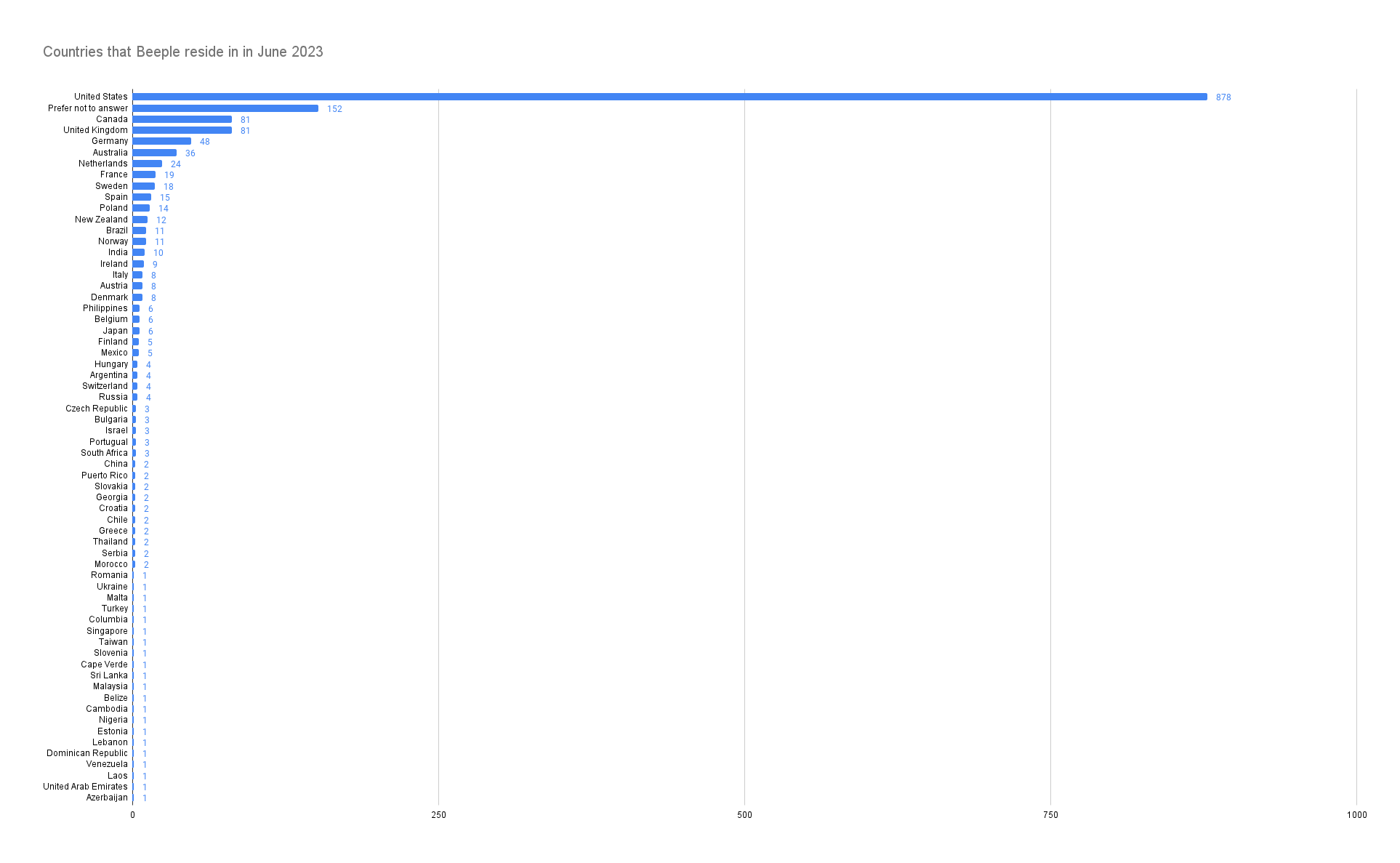
This one's a big graph. Though we can notice most people are from the US. Would be nice to see more countries represented though a big part of it likely has to do with language. (You will need to open the big graph in another tab, it's too big to show properly.)
Gender identity of Beeple

So, as expected, mostly men. However, less than expected which is nice to see. There should be outreach to at least equalize this.
Sexual orientation of Beeple
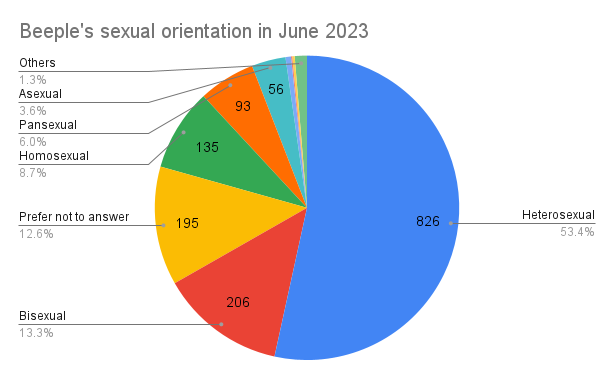
This is kinda surprising. It seems we managed to get a lot more LGBTQ+ people than expected considering most of you all come from Reddit - so this is nice to see. This is most likely because of our focus on a safe space.
Whiteness of Beeple
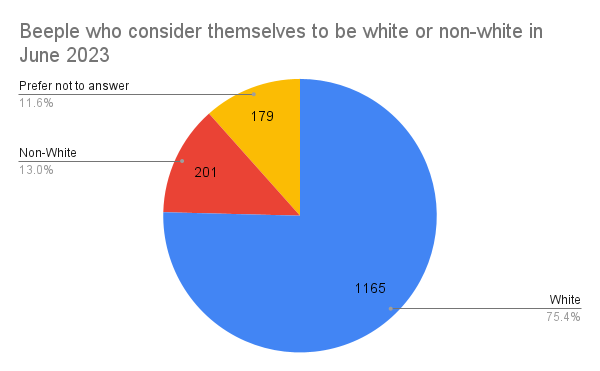
As expected, mostly white which is unfortunate. I think there's outreach to be done in that regard as well.
Neurodivergence of Beeple

We seem to have a really surprising amount of neurodivergent people! Definitely nice to see.
Beeple with disabilities

I.. have no idea how to interpret this data so I'll just say, shiny graph.
Beeple's awareness of the Fediverse
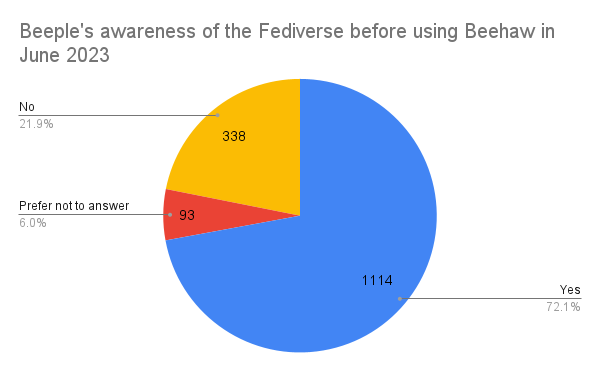
Most knew about the fediverse but still a good 20% had not heard about it so glad to see you all managed to find your way here!
How Beeple have been dealing with Beehaw
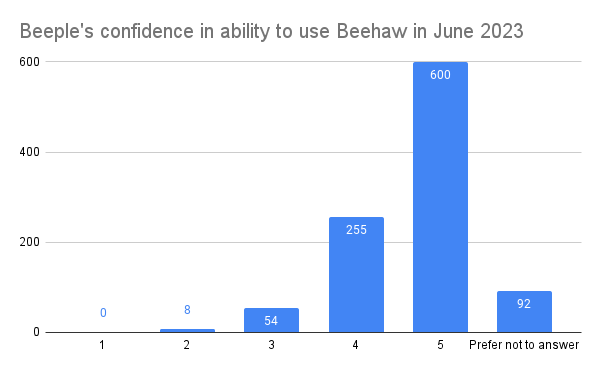
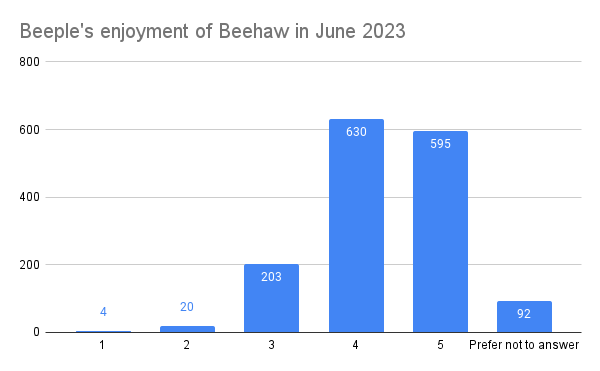
It seems most people feel relatively confident in their ability to use Beehaw and most people seem to enjoy it. That makes me really happy to see. Feels rewarding, feels good.
Conclusion
I wanna thank everyone for the feedback about the survey and its questions - we'll do better next time! I'm glad we did this survey because it shows the areas to work on in terms of outreach! Thank you all for your participation!
i absolutely promise that your country does, whether you are conscious of that or not. whiteness, in any case, is a social construct (and even if it wasn't, race and ethnicity are also basically arbitrary) so you're not going to ever get a singular, satisfactory answer on this. the whole point at a sociological level is that it's an amorphous, hegemony-based category that transcends political barriers and basically divides the world into "haves" and "have-nots". it doesn't make sense because it can't ever, it's arbitrary, and it's not a "serious" category because it's not really intended to be.
unfortunately, on that basis it's also the single most important (and unambiguous) descriptor of one's racial identity in a global context--so we're kind of locked into using it here because it is actually really important to know what our community looks like, and we don't literally want to use American census groupings.
I meant that there is no official sanctioned discrimination (but of course there is racism in my country). If I remember correctly, in the US you have documents where you have to write your ethnicity or the color of your skin. This makes me think that there is an active effort by the government to categorize people based on the color of their skin. This for me is immoral.
It also is ridiculous because there is no definition of what 'white' is or how much white is white. There must be like thousands of shades of skin colors but no definition of what white is.
And I'm saying this because there also countries you may call white in Europe that are dirt poor and clearly in the have-nots bag so this 'whites have' and the rest 'don't have' is a very american way of understanding this.
Again, just hoped for a less americanized point of view.
Uh, outside of census data, no, I don't think ethnicity or colour of skin is in us documents. The discrimination does not come from law targeting based on ethnicity but usually the characteristics of the social group that are inherited from segregation and slavery.
Also, yes, there is no definition of white, it's why we phrased it "do you consider yourself white?".
It's not as bad now, but these used to be on things like IDs/driver's licenses and birth certificates. My parents (both born in the late 60s, one white, one biracial) have the races of both parents listed (and in the case of my maternal grandfather, still listed as 'Negro') on their birth certificates, while mine from the 90s does not, IIRC.
One area of official documentation that absolutely does still are tickets from cops, whether traffic or otherwise, as every traffic ticket I've gotten in my life has listed my race. (Amusing for me as a biracial person because I've gotten three different ones listed over the years, but I digress.) There's still things in the legal system that very explicitly call out race still.
Oof, that's awful. I didn't know.
For recent tickets, is it actually to make sure that demographics are accounted for with police action in the hopes of countering racial profiling? As for the legal system, is it about asking a jury to be of a race similar to the defendant (is that a thing? I'm not too familiar)?
I'm not sure, but I would guess that it's for the first, at the very least. At least for my traffic tickets, it was not something asked of me, but was written down by the ticketing officer. I have no experience with the actual trial side, but again, your assumption is mine there as well.
In this context it's mainly shorthand for privilege because white includes most European ancestry. I can't speak for everyone here but I absolutely love diversity and I'm thrilled we have such good representation on so many levels but this is a good potential target for improvement.
As an American, there isn't any official paperwork I've ever seen in the US that requests, let alone requires, my skin tone or race, with the sole exception of the US census and the occasional optional and anonymous EEOC questionnaire that some job applications have, neither of which record anything to do with skin color or appearance.
So are you saying 23andme is lying about my ancestry
Honestly? Yes, kinda. Ancestry is a lot more a cultural phenomenon than a genetic one.